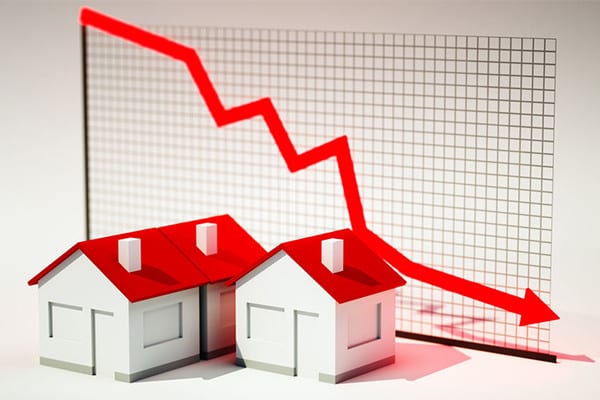
Helen Collier-Kogtevs
[PREDICTION] Property Market Collapse and how to prosper from It!
 In my last blog post, “Collapsing Property Investment Market and How to Turn it Around”, I discussed the effect of all the changes currently happening in the property market and the impact it is having on property prices.
In my last blog post, “Collapsing Property Investment Market and How to Turn it Around”, I discussed the effect of all the changes currently happening in the property market and the impact it is having on property prices.
It seems that the property market is having to deal with a barrage of negativity coming from all directions, making it impossible for it to sail through unscathed. And as I said in my previous blog post “Property Prices to fall by 20 per cent”, will become a self-fulfilling prophecy.
Property market uncertainty has been caused by a number of factors including lending changes made by APRA, the banking Royal Commission and a decline in new housing starts. Is it any wonder that property investors and owner occupiers alike are being “spooked” out of the property market? This decline is being reflected in poor auction clearance rates in Melbourne last weekend which dropped to an all-time low of 40 per cent.
So with all this and more going on, I’m confidently suggesting that property prices have peaked, and the downside of the property cycle has started and I want to share with you how to get in early and reap the rewards even though house prices and buyers are still on the decline.
Boom and Bust Cycles
We all know that what goes up must come down and the property market is no different. We have enjoyed strong capital growth over the last several years, especially in Melbourne and Sydney with some areas enjoying up to 80 per cent growth but… and there is a but… we also all know that price growth in the double digits is unrealistic, unsustainable and cannot continue indefinitely because it will rapidly become unaffordable.
So expect to see a slowing down of the market across the board for 2019 and 2020 before it then recovers and continues on its merry upward trajectory, provided that is the government of the day, expected to be Labor, ditch their ill-conceived policy changes to negative gearing, capital gains and Trust taxes.
What should Property Investors be doing Now that Prices are Dropping?
While property prices will be busting and/or stabilising over the next 12 months, the immerging huge plus in the Property Cycle will be in Rental Yields (rents).
So what should you, as a property investor, be doing to accommodate the above changes in the market? Should you just sit on your hands waiting for the market to correct itself or should you be changing the way you invest?
As stated in my last blog, apart from property prices falling, current conditions are almost perfect for investors to buy property. This is because interest rates are at an all-time low and predicted to stay that way for a long while yet, finance is readily available to the right type of borrower, (even though the banks have made loan servicing calculators more difficult) and vacancy rates are at an all-time low and declining.
You may have seen a recent report by SQM Research which showed that rental yields have gone up by 2 per cent, however what the data isn’t showing is what is going to happen over the next 12 months as existing property rental leases come up for renewal.
I know from recent personal experience that I have been able to increase the rent of one of my investment properties by a whopping 17% and I predict that this level of rent increase will be common place over the next couple of years. This high level of rental property demand will only be exacerbated by the continued high levels immigration into Australia and the curtailment of apartment and housing construction, which is something that won’t be able to be turned around overnight.
So, what should you as an investor be doing to take advantage of these conditions without losing your shirt?
If you have rental properties, the first thing that you need to do is study mindfully what the rental market is doing and where it is headed and based on levels of rental property supply and demand in the area(s) that your investment is in, increase your rents, and don’t be shy about how much you increase it by.
If you are looking to buy an investment property, you will need to consider your buying strategy and whether it needs to be tweaked or not. That is, if your strategy is a neutrally geared, positive geared or positive cashflow strategy then what changes, if any, do you need to make in order to accommodate the new market conditions?
Let’s run through the impact that the market changes could have, one by one.
 Strategy
Strategy
If your buying strategy is to buy negatively geared property, then the things that you will need to consider in the current property market climate are:
- more difficult bank loan servicing calculators which could significantly impact on how much you can borrow and how many investment properties you can buy.
- If you are in accumulation phase of building a negatively geared property portfolio this may cause you to consider changing your negatively geared strategy to a more conservative, lower risk strategy such as a positively geared or even positive cash flow strategy. By doing so it may, depending on your circumstances, improve your borrowing capacity with the banks and allow you to buy more investment properties.
- If your buying strategy is already a conservative neutrally geared to a positively cash flowed strategy, then you may not be adversely affected by the new market changes and may wish to continue using this strategy.
- If you are uncertain about what to do, then discuss options with your property mentor or coach.
Property Prices
The question here is: should you be buying at all in a falling market? The answer is a cautionary yes, because buyers are few and far between and clearance rates are below 50% in most areas and this means that there will most likely be very little competition when buying, so bargains will be on offer.
With falling property prices, you will need to buy at a discount (I’d aim for at least 10 per cent below asking price) and by obtaining a discount, it will act as a buffer should prices fall further. Negotiating a discount now should be easier compared to when the market was booming, because in a falling market no one really knows what the market value of a property should be.
Trying to pick the bottom of the market before buying is littered with investors who in the past have got it wrong so play it safe and just negotiate bigger discounts rather than missing out on a great opportunity.
A lot of people ask me when is a good time to buy and my answer is always the same… if you have your strategy sorted, your financial ducks lined up and your buffers in place, then NOW is the best time to buy, as yesterday has past and the future hasn’t happened so really, now is all you have. 😊
If you are undecided about which area to buy in, detailed due diligence and research of where property prices are falling, can sometimes help you to choose one area from another.
My tip is to have a look at historical data to see how the suburb has performed over the last 10 years. This will help you to see what kind of peaks and troughs it has experienced and whether the suburb is a good risk for you.
What about finance?
APRA and the banks have put the brakes on Interest Only (IO) loans. This means that instead of being able to readily renew an IO loan after 5 years, as was the case, banks are now insisting that borrowers apply for a completely new loan if they want to continue with an IO loan.
Because property prices have fallen and because of the more stringent borrowing conditions that banks now apply to loan applications than was the case 5 years ago, some existing loans will become ineligible for refinancing and/or you may have to find a bigger deposit. This situation could of course spell disaster for the investor.
If you don’t want to continue with your IO loan then it will automatically revert to a Principal and Interest (PI) loan, that is you will have to pay higher monthly mortgage payments because you are paying down the Principal as well as the Interest.
The other thing to do is to make sure you play “hard ball” when renegotiating interest rates with the banks. They don’t want to lose your loan(s) and will more than likely come to party. This is essential if you go from an IO to a P&I loan. Hard ball interest rate negotiations when loans transfer from IO to P&I can save you enormously and given that P&I interest rates are lower than IO, you’d be mad not to avail yourself of the benefits.
I personally did this when some of my loans came off IO and went to P&I. A couple of hours on the phone calling the lenders saved around $20,000 in interest payments over my portfolio. It was well worth the time and effort and frustration at having to sit “on hold” for ages while waiting to escalate my negotiations up the decision-making tree in the bank concerned.
 Taxation
Taxation
If you are concerned about buying property before Labor’s Negative Gearing, Capital Gains tax changes come into effect then don’t be. These changes, we are led to believe, will be grandfathered, which means that existing Negative Gearing and Capital Gains tax laws will still apply if you purchase the property before the new changes are legislated. The devil is in the detail however, so until we see the legislation, we won’t know exactly what impact it will have.
APRA and Banking Royal Commission
Since property prices have started to fall, APRA have removed their 30% limit imposed on the banks on investor loans and I believe they will further soften their restrictions in response to, declining property sales and steeper declines in property prices. They will need to because they will need to re-stimulate investors to re-enter in property market if they are to keep rents low and have any hope of having enough properties to meet rental demand.
Housing Construction
The banks are squeezing construction finance to developers, which in turn is leading to a massive supply shortage of rental properties as immigration and population increases continue on their merry way. There’s not much investors can do about this except enjoy the ride as rents skyrocket because the scarcity of available rental properties in the market. Use the extra income to build your buffer in a mortgage offset account.
Possible Recession
There’s talk about there being an over correction in the market and therefore possibly a recession. In my opinion, I think that’s crap (can I say crap… yes its my blog 😊) because I believe the incumbent government, whoever that is will step in and change their policies before it is too late. With unemployment at such low levels, there will also need to be a massive jolt to the economy for a recession to happen in the short term. Will there ever be a recession, yes, I believe there will but not anytime soon.
What the government needs to seriously take into account is that for every household in Australia, whether they are owner occupied or a rental properties, there are “employed” voters so while employment is strong, people will generally be able to meet their financial commitments.
Watch this space on “Employment” as this is an indicator on the health of our economy. While its low and going along smoothly, no recession is likely and the massive infrastructure spending by Federal and State governments will keep it that way for the foreseeable future.
So what should you as an investor be doing now?
If you are an investor thinking about getting into or back into the market, then make sure you are savvy about what you can afford and how you manage your money. With interest rates at an all-time low, banks still keen to lend albeit less amounts, population exploding, potential skyrocketing rents, it is prime time to continue investing.
However be mindful when buying in a falling market.
The important thing in today’s market is to adjust your strategy to a more conservative strategy, even if that means a more positive cashflow strategy.
Consider buying now before Labor’s regressive Negative Gearing and capital Gains tax policies become law and buy in areas where property prices have fallen the least and show a history of solid growth over a property cycle. This will more than likely insure you against future property price shocks.
And finally, for all you investors, the Rental Boom will last for about two or so years, therefore now is the time to increase your cashflow because this too won’t last forever.
Until next time, happy investing.
Helen Collier-Kogtevs
Share this post
Become a successful Property Investor















